#♛ ¦ ɪ ᴡᴀɴᴛ ᴛᴏ ᴍᴀᴋᴇ ᴛʜᴇᴍ ʜᴀᴘᴘʏ ༺ character study.
Text
character study The Hierophant.

Doma's appointed tarot card points to a core theme of his character; self-actualization. His presence in the main plot often heralds another character's moment of self-discovery. The hollowness of his gaze as well as the reflective shades are a symbolism for the way he reflects the emotions of others and leads them to become more in-touch with themselves as a result of it.
During the fight with Inosuke and Kanao, both slayers are led to a revelation about themselves that leads them to overcome an inner conflict that sits at the center front of their character themes; in Inosuke's case, the acceptance of his origins and in Kanao's, the acceptance of her emotions.
The Hierophant's imagery speaks of passing down spiritual wisdom, a shared group identity and a rite of passage to enter the next level. The way Doma chooses to convert someone into a demon also plays into this theme. Unlike Kokushibo or Akaza who chose their progeny based on heritage or skill, Doma picks the ones who have suffered the most, and through his blood offers a chance for them to keep living as demons and manifest their hatred. The samsara he offers in that respect may come as a promise of alleviating one's burden; but to become an oni is to live in eternal hunger and pain.
The Hierophant exists in balance between the conscious and the subconscious mind; which is a prevalent theme of Doma's character as well. In some parts of his dialogue, he demonstrates self-acknowledgement and consciousness of the immoral nature of his actions, while in others he comes across as delusional and deeply deranged in his belief that eating people would alleviate their burdens.
This duality reflects Doma's intrinsic confusion as to what his purpose in this world is; a sore subject that, when touched upon by Kanao, leads to the only moment we see him become reactive and aggressive throughout the entire series. On the one hand, he exists to 'make people happy', but on the other, his visceral incapacity to empathize with them leads to the exact opposite of that.
The upward reading of the card speaks of traditional values, marriage, learning, counsel, spiritual guidance, religion. The downward reading regards an abuse of one's position, rejection of family values, non-conformity and poor counsel. Both of these sides co-exist in Doma's character as he, too, can be read in different ways.
#♛ ¦ ɪ ᴡᴀɴᴛ ᴛᴏ ᴍᴀᴋᴇ ᴛʜᴇᴍ ʜᴀᴘᴘʏ ༺ character study.#(( and tbh some of my favorite plots revolve around him having that effect on others ))
8 notes
·
View notes
Text
character study. the origin of misanthropy.
This post contains manga pannels, so beware of MANGA SPOILERS under the cut!
Disclaimer: I've been writting villains for well over 10 years at this point and I'm deeply aware that studying the 'humanizing' aspects of them can often be seen as excusing their actions, so I'm adding a disclaimer here to clarify that I am in no way excusing anything — a villain is a villain, but a villain is also a character and personally, I prefer them three-dimensional. Also, all thoughts expresssed on this post are only my own take on the character.
𝗧𝗪𝘀 𝗳𝗼𝗿 𝗺𝗲𝗻𝘁𝗶𝗼𝗻𝘀 𝗼𝗳 𝗖𝗛𝗜𝗟𝗗 𝗔𝗕𝗨𝗦𝗘/𝗡𝗘𝗚𝗟𝗘𝗖𝗧, 𝗥𝗘𝗟𝗜𝗚𝗜𝗢𝗨𝗦 𝗔𝗕𝗨𝗦𝗘, 𝗖𝗨𝗟𝗧 𝗔𝗕𝗨𝗦𝗘
Dōma's hateful views on humanity are mainly sourced in three things:
His parents being poor role models.
Pent up frustration from the emotional labor he was forced into as a child.
His isolation from the outside world and the fact he was permanently exposed to people's trouble — thus growing to think humans are whiny and inherently miserable creatures.
The only canonical information we receive about Dōma's background comes from his own lips; hence reflects his own perception of the events that transpired. Dōma however is an unreliable narrator; because all recounts of past events are filtered through his narcissistic personality & apathetic nature.
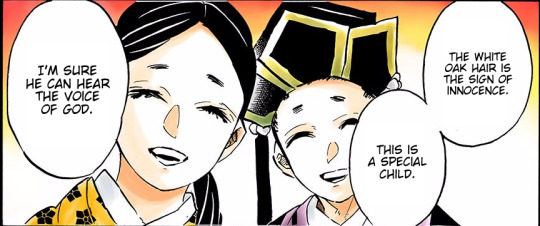
From the crown on his father's head, which is the same crown Dōma later adorns as the Lord Founder of Eternal Paradise, we are given to understand that this cult already existed & was run by his parents. That would make his family the leading family of the cult. Dōma mentions his father would 'lay hands' on the female followers, as well, from which we can assume he was a man that would exploit his influence as the leader, among other inherently abusive tactics deployed to maintain leadership ( induced dependency, isolation, thought reform etc ) as is often the case with cult leaders. So his role-models were disturbed people who later on proved to be capable of violent acts as well; even if those acts had not been directed towards them at the time, it would still serve to 'normalize' these behaviors in Dōma's perspective.
In his mind, based on his parents' behavior, humans will take advantage of others for personal gain, be greedy & manipulative, grow violent against each other & display poor control over their emotions and show weakness & willingness to believe illogical things when confronted with something they fear deeply, such as the concept of death.
From that narrative we can assume that Dōma's parents may have held genuine belief that their child was special & gifted, or the crown was simply passed down to him as he was the Founder's child. In either case, Dōma was given special treatment from birth; which inevitably warped his view of himself and others around him. The contempt he expresses towards others is sourced in the understanding he grew to develop based on his experiences; it is not necessarily what they had been experiencing as a child, however.
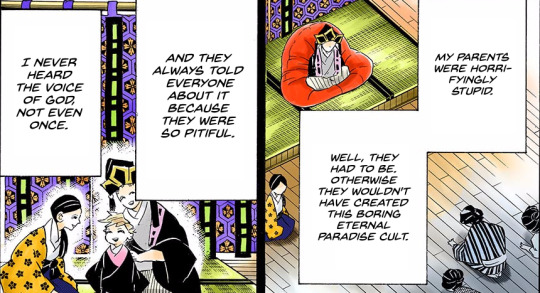
Watch how offensive he grows towards his parents. The amount of contempt in his narration is notable; he thinks of them as weak & pathetic — almost as if there's some pent up grudge against them. That's the first inconsistency in his narration. A child born without any emotion would not be so quick to attach a negative quality to the worshipping. Instead, Dōma's understanding ( 'They were stupid', 'They were pitiful' ) is a product of his repressed confusion & anguish. As an inherently narcissistic character, Dōma could never accept an image of himself as a confused & scared child that was put in an uncomfortable situation. Instead, he protects his Ego by warping the image.
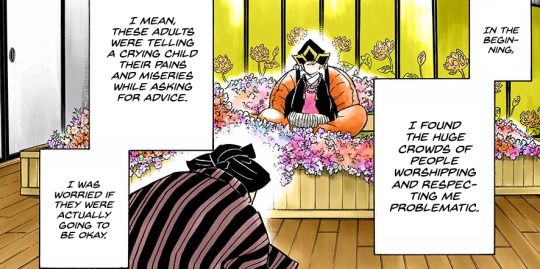
Cognitive dissonance is a major theme of Dōma's childhood. On the one hand, his parents ( the main source of information in the beginning of a child's life ) are telling him that Gods exist & he has been chosen by them, thus ought to offer his council to other adults. On the other, Dōma is not hearing their voices or experiencing any godlike intervention. Cults rely heavily on the censoring of independent thought; critical thinking & distinct personality become 'evil' traits, in a setting where only absolute devotion is rewarded with the leading figure's favor. Dōma was left to deal with his worries & confusion alone; and yet again his conclusion, that the worshippers are pitiful for looking to him for advice, is a hateful one.
How did he come to that conclusion? Was it perhaps after hours upon hours being forced onto that throne, listening to the stories of other people that expected some words of wisdom from him; words that he was not in a place to deliver; and so, when he didn't know what else to do, he cried out of frustration ? Couple that with the fact he would have received special treatment as the Founder's son, possibly being pampered & exempted from consequences, and that frustration easily turns to disdain and disrespect for others. His misanthropic view on humanity is a NARCISSISTIC DEFENCE MECHANISM.
Narcissistic defenses are those processes whereby the idealized aspects of the self are preserved, and its limitations denied. They tend to be rigid and totalistic. They are often driven by feelings of shame and guilt, conscious or unconscious.
Dōma's relationship with the cult has shaped his view on humanity as a whole. But, at the same time, it is because of the cult that he has grown alienated from humans and doesn't understand them. And that has a negative quality attached to it; he thinks of himself as someone 'defective' because of his lack of "normal" emotions ( as concurred by this post ) So for him, the very place that defines him is the place that has caused him to suffer.
#tw child abuse#tw religious trauma#(( Ill decorate these properly w graphics at a later date bc im still working on psds etc and-- i'd rather prioritize drafts atm xD ))#manga spoilers#long post tw#♛ ¦ ɪ ᴡᴀɴᴛ ᴛᴏ ᴍᴀᴋᴇ ᴛʜᴇᴍ ʜᴀᴘᴘʏ ༺ character study.
9 notes
·
View notes
Text
character study. For the entirety of the KNY franchise, Dōma has never been seen taking anything seriously. Even whilst taking painful poisonous blows or near-lethal damage, his smile barely even falters & he deals with the pain as if it's nothing. It's been established that he's not even moved by Muzan's presence, unlike other oni, and even seems to provoke other demons, like Akaza, even if they're able to inflict tremendous damage to him. The only moment when Dōma is ever depicted as being upset by something, is this:

Granted, this guy comes off as pretty delusional in the first place, wondering why the Hashira are so furious with him & whatnot, but the second Kanao calls him out Dōma does a complete 180 & becomes coldly frustrated with her, even declaring that he considers her a BULLY. He thinks her calling him out on being incapable of emotion is a total blow below the belt, which confesses to us, the reader, that he considers this to be a defect.

Even if Dōma's unfeeling nature was advantageous to him as a demon, he has never expressed gratitude towards it. If anything, he seems to lament on it & moreso on the fact that he's not even capable of properly feeling sad about his defeat & imminent death. Dōma thinks of himself as defective for the fact that he is unempathetic and that's why he's gone to such extends to hide it. That he was 'born with an inability to feel' is a product of his own comprehension & the conclusion he has reached while growing up as an emotionally stunted child whose feelings were often deemed inappropriate or weren't allowed to be expressed.
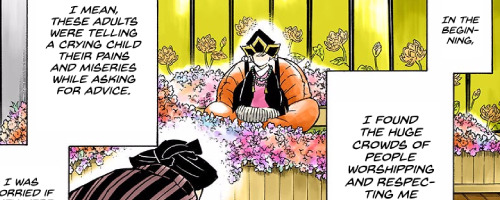
Dōma tells us himself that he thought of his upbringing as a problematic situation, but he has given his own explanation as to the reasons why. Naturally, since he's never had anyone that could look into his past with empathy & care (not saying that he'd deserve that at this point, of course) his explanation, the one he gave as a CHILD at the time, is the only one he has to believe in. Truth is something subjective. Dōma didn't know why he was crying; he might as well have been crying as an instinctive reaction to being trapped in an uncomfortable situation.
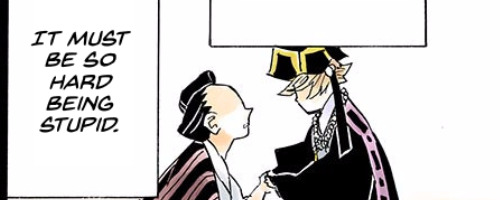
Being a child, his own needs should have been prioritized in the eyes of his parents. Instead, he was put on a chair, adorned with garments that could barely fit him ( another symbolism of how brutally unfitting it was for a child to be put in such a situation ) and made to listen to people's psychological burdens on the daily whilst being under-equipped to handle the toll. Add to that having to lie & recite things he knew were not truth, being deprived of the warm nurturing environment a child needs to develop properly and mature. He was forced into EMOTIONAL LABOR at a very young age. Him becoming detached from others was only expected.
And it bothers him. It bothers him in the same way that Akaza was bothered by the guilt of having been 'too weak' to salvage his loved ones, it traps him in a state similar to Gyutaro permanently striving to protect Ume, which he failed to do in his human life. Like all Upper Moons, Dōma is also a suffering soul.
14 notes
·
View notes
Text
character study. manipulation.
To preface this; Douma is innately drawn to pain, in the same way any adrenaline junkie is. He is coded to be an antisocial personality with distinct narcissistic elements; and so he chases after extreme sensations & highs in order to break the boredom that comes with his detachment from others and the world itself. There's a duality to that; on the one hand, a need for control because he cannot find security in attachment. On the other, a disdain towards it, because it confines him. This is pivotal to how he views relationships with others; on the one hand there's a need to control them and have the leverage at all times, because he cannot handle vulnerability. On the other, he yearns to be stripped to his most vulnerable state. And so he is manipulative, to control the people in his life, but he is not outwardly manipulative, in a lousy effort to fool his own senses into feeling something towards them.
It's second nature. It's not something conscious. In his mind, when he acts like the victim in spite of being the perpetrator, that is a safety measure, a protective bubble to keep the delusion going that he is truly touching something. The only genuine moment of emotion for Douma, in his canonical storyline, comes when Kanao bursts that bubble.
It is an unfortunate truth that, especially for male/masculine characters, manipulative traits are often represented only in the form of threats/violence or sexual coersion. And that can be partially true to Douma's mannerisms, as well, but his primary method of bending others to his whims comes through performative innocence. He provokes them into hurting him and then acts wounded to guilt them for it.
He makes himself smaller and appears outwardly friendly towards others. Perceptive characters will see through the vanity and conceit of his words, and in the anime/manga, that's about the end of it because his character is not expanded upon further than that. But realistically speaking, that's hardly the end. Because he's still equipped with an arsenal that will definitely appeal to the more empathetic characters.
Douma is willing to appear vulnerable and actually prefers that method of approaching others. He wears different facades as the situation calls for it. In his everyday life he is placid, he does not pick fights, he's not outwardly violent and speaks calmly, never directly insulting others. He doesn't raise his voice, he doesn't cuss. Because he moves with the confidence of a cold, calculating killer that does not need to do all that. He's above it and simultaneously he uses it to paint a pious image of himself. Like he's better than that.
In his interpersonal relationships, he prefers to assume a submissive but nurturing role. Giving, for Douma, is an act of manipulation. He gives and gives to the other person freely; until the time comes that he will take it back all at once. This extends to his actual fighting style ; allowing them to land blows on him and toying with his meal until he is backed into a corner and then unleashes his full force ( think about how he dealt with Kanao and Inosuke! ) He's an expert at lovebombing, allowing the other to think they are gaining power and leverage over him. And in a way, they might be, because he's not impervious to sentiment all together. This all is not a conscious act, as all trauma based mechanisms are not entirely a conscious act. It's just how he is. Is his affection genuine? It's as genuine as it can be. There will always be an opportunistic quality to it.
4 notes
·
View notes
Text
character study. Childlike qualities.
As his given name would suggest, Dōma is a very youthful character. Both appearance and attitude wise, he comes off as energetic, imaginative and light-hearted. When around people he considers 'close' to him in some fashion or another, his mannerisms can grow more spontaneous, as a child's. That has a lot to do with finding comfort in age regression, sourced in his severely traumatizing childhood, where he was not allowed such expressions.
It's not just the babyface. His actions sometimes carry a feel of childlike innocence; innocently asking an offensive question, overstepping boundaries, going on random rant whilst sharing a story, responding to stimuli in an ego-centric fashion as a child would. He didn't get to mature normally, so a lot of these behaviors are to be expected. It's unclear whether there's intention behind it; but there could be, at times.
His blood art is greatly enhanced by that fact. Cryokinesis is all about moving the ice particles. In the hands of another, it may have been little more than gusts of deadly hoarfrost, but Dōma uses them much like a kid would building blocks. His primary strength, that lies in the proficiency of his blood art, is the absence of 'rational' limits; because he can think in the way a child would, and that's why a lot of his battles - especially his blood battles - carry the same feel as a kid playing with action figures. That makes him more unpredictable to his opponents and greatly expands his arsenal, from the animated creatures he can make to the weapons.
#child abuse tw#(( one day i will make an in depth post abt cult culture and what that does to children ))#(( for now we can focus on smt more light-hearted lmao ))#♛ ¦ ɪ ᴡᴀɴᴛ ᴛᴏ ᴍᴀᴋᴇ ᴛʜᴇᴍ ʜᴀᴘᴘʏ ༺ character study.
2 notes
·
View notes